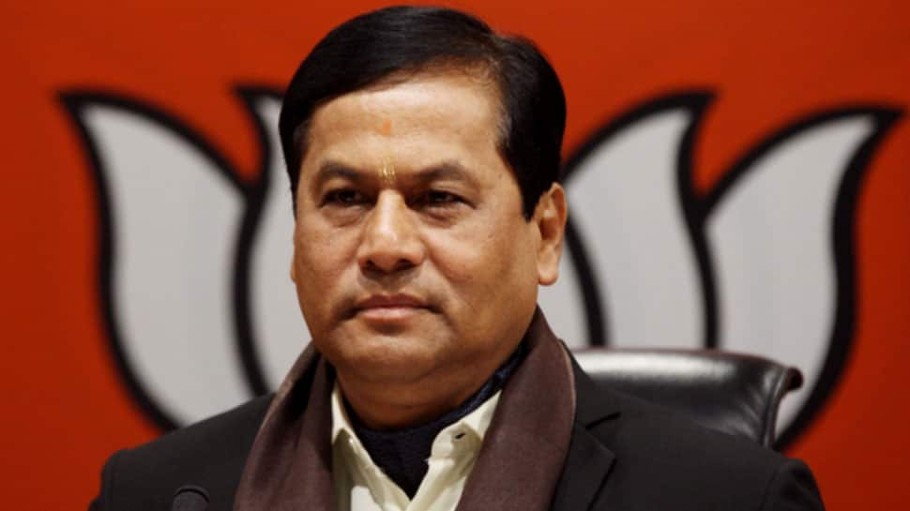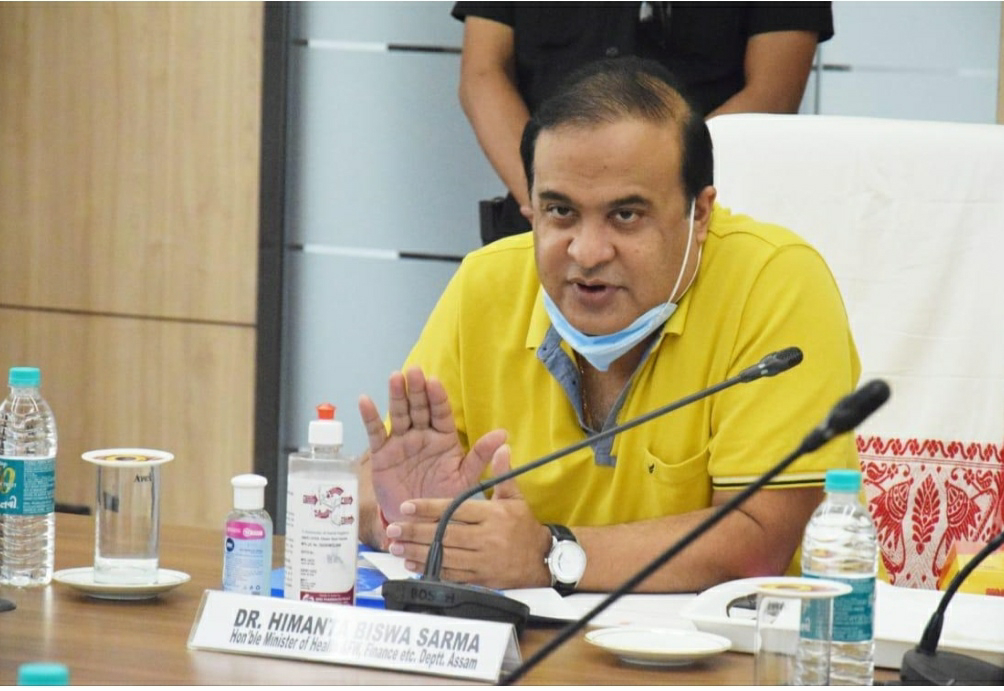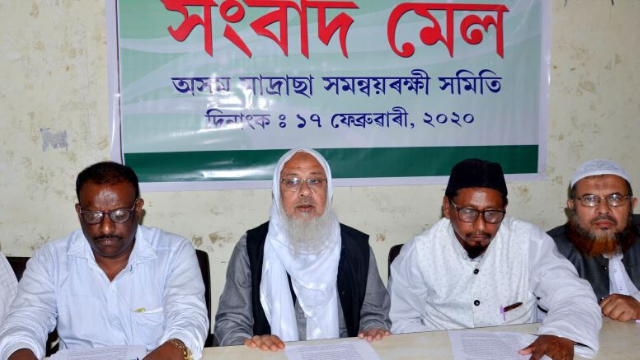
- Home
- News
- Analysis
- States
- Perspective
- Videos
- Education
- Entertainment
- Elections
- World Cup 2023
- Features
- Health
- Business
- Series
- Economy Series
- Earth Day
- Kashmir’s Frozen Turbulence
- India@75
- The legend of Ramjanmabhoomi
- Liberalisation@30
- How to tame a dragon
- Celebrating biodiversity
- Farm Matters
- 50 days of solitude
- Bringing Migrants Home
- Budget 2020
- Jharkhand Votes
- The Federal Investigates
- The Federal Impact
- Vanishing Sand
- Gandhi @ 150
- Andhra Today
- Field report
- Operation Gulmarg
- Pandemic @1 Mn in India
- The Federal Year-End
- The Zero Year
- Premium
- Science
- Brand studio
- Home
- NewsNews
- Analysis
- StatesStates
- PerspectivePerspective
- VideosVideos
- Entertainment
- ElectionsElections
- Sports
- Loading...
Sports - Features
- BusinessBusiness
- Premium
- Loading...
Premium

Scrapping of madrasas in Assam exposes religious bias and stereotypes

Fifteen-year-old Hafizur Rahman is confused about his future. A student of Class 10 at Howrarpar Senior Madrasa in Assam’s Dhubri district, Rahman aspires to be an Islamic scholar and teach at a madrasa. He, however, has put his dreams on hold for the time being after the Assam government enacted a law to convert all pre-senior (elementary to Class 6 or Class 8) and senior (from Class 6 to...
Fifteen-year-old Hafizur Rahman is confused about his future. A student of Class 10 at Howrarpar Senior Madrasa in Assam’s Dhubri district, Rahman aspires to be an Islamic scholar and teach at a madrasa.
He, however, has put his dreams on hold for the time being after the Assam government enacted a law to convert all pre-senior (elementary to Class 6 or Class 8) and senior (from Class 6 to the higher secondary level) government-run madrasas into general schools under the state board.
“It seems I have to reset my priorities now as I am not very sure whether I will be able to pursue Fadilul Ma’rif (FM) and Mumtazul Muhaddithin (MM) courses,” he says.
FM is a graduation level theological degree course while MM is a post-graduate course.
The new law says all students currently in the last two years of the FM and MM courses will continue their study till March 31, 2022, to complete their final examination.
“Moreover, there is no point trying to be a madrasa teacher if there are no madrasas around,” Hafizur adds.
Zaherul Ali, a student of class 8 at Singimari Madrassa in Sonitpur district of Assam, too, is confused. But his reason for confusion is different.
Zaherul, a Virat Kohli fan, wants to be a doctor.
“I have never ever felt that being a madrasa student it will be difficult for me to attain my aim of becoming a doctor. My favourite subjects are biology, chemistry and maths. I always got proper guidance in these subjects from my teachers in the madrasa,” he says.
Zaherul is unable to understand why the government feels that madrasas need to be converted into general schools when the institutions have already been imparting general courses.
Explicit bias
Madrasas are the most ‘misunderstood’ educational institutions, often being accused of—not only in India but also in Muslim-majority countries such as Bangladesh—promoting extremism.
The reputation of the age-old institutions first came under scanner when it was found that most leaders of the Taliban in Afghanistan, including its founder and dreaded terrorist, the late Mullah Mohammad Omar, were products of puritanical madrasas.

The suspicion further deepened in India after names of madrasas got linked to a few terror activities such as a bomb blast at Khagragarh locality of Burdwan district in West Bengal in October 2014, or recovery of explosives near a madrasa in West Delhi’s Janakpuri area following the confession of a Harkat-ul-Jihad-al-Islami (HuJI) terrorist Mohammad Iqbal alias Abdur Rehman in 2008.
There are more such instances that led to the loss of reputation for these institutions of Islamic learning. Having said so, a closer study of the madrasa system would reveal the explicit bias behind such stereotyping.
Majority of the madrasas in the country, in fact, are inclusive and doing a great service to the society providing education in far-flung and remote under-developed areas such as the char areas of Assam where the otherwise poor children would not have any excess to schooling.
Contrary to popular perception, madrasas in many states, including West Bengal and Assam, enroll a large number of Hindu students and provide modern education.
For instance, in West Bengal, one of the earliest states to modernise madrasa education system, the over-600 such institutions recognised by the government have modern curricula and have about 17 per cent non-Muslim students.
They offer courses in mathematics, computer science, physics, chemistry, biology, English language and literature, and other regular subjects. Islamic studies and Arabic only comprise a small part of the curriculum.
The introduction of science and other modern subjects in madrasa education is also not a new development. The tradition goes back to the reign of Mughal emperor Akbar.
During his reign, Iranian scholar Mir Fatehullah Shirazi introduced mathematics, medicine, logic, astronomy and other such subjects in madrasas.
Since the establishment of the first madrasa in India at Ajmer in 1192 CE, the education system gave the country many eminent non-Muslim scholars and thinkers, including Raja Ram Mohun Roy, Motilal Nehru, Rajendra Prasad, to name a few.
Another common misconception is that the madrasas are impeding higher and modern education of Muslims in India. The government surveys, however, negate this theory revealing that only four percent of Muslims attend a madrasa full time.
Poor understanding or wilful ignorance?
The blinkered perception is largely due to poor understanding of the madrasa system in the country, says Israrul Haque Mondal, president of Bengal Madrasa Education Forum.
There are government-run as well as private madrasas in the country. Some of these private madrasas are unregulated and operate shadily, bringing bad name to the entire system, Mondal points out.
Citing illegal activities of a few unregulated and unrecognised madrasas, the Hindu right-wing led by the BJP often uses these institutions as a political tool to polarise elections.
Critics feel that it is with this political motive that the BJP-led government in Assam last month (December 2020) enacted a law to convert government-run madrasas into general schools under the State Education Board of Assam.
The government’s argument in support of the move is that in a secular country, the state should not fund any religious educational institutions to impart theological lessons.

Lacking legal sanction
The state government treating the madrasas as religious institutions does not have a legal sanction, says a Guwahati-based lawyer AS Tapadar.
He points out that the Gauhati High Court on more than one occasion observed that madrasas are not religious institutions.
Tapadar is soon going to challenge the new law in the court on behalf of the Assam Madrassa Coordination Committee.
To buttress its “secular” theory, the state government, on its part, has also decided to “shut down” all the 98 government-run Sanskrit tols (schools) in the state.
But there is a catch.
These tols will, however, be handed over to the Kumar Bhaskar Varma Sanskrit and Ancient Studies University—a government-run university established in 2011—to convert them into centres of academic learning and research on Indian culture.
According to data from the State Madrasa Education Board, Assam, there are 614 recognised madrasas in the state. Out of these, 102 run under the Senior Madrasah Education System and the rest 512 are under the High Madrasah Education System.
The new law seeks to repeal the Assam Madrassa Education (Provincialisation) Act, 1995 and the Assam Madrassa Education (Provincialisation of Services of Employees and Re-Organisation of Madrassa Educational Institutions) Act, 2018.
The new legislation proposed to convert madrasas into upper primary, high and higher secondary schools with no change of status and pay, allowances and service conditions of the teaching and the non-teaching staff.
Explaining the law, Assam Finance and Education Minister Himanta Biswa Sarma said, “The Bill is for government-run madrasas only. In future, we plan to pass a law asking qawmi (private) madrasas to register with the state government. The approval will be given only to those madrasas that introduce general subjects like science and maths along with qawmi education.”
The State Madrassa Education Board will also be dissolved after the results of the academic year 2021-22 are declared. There will be no fresh admissions in any of the existing courses in these madrasas, prescribed by the board, from April 1.
Imran Hussain, Chairman of the State Madrassa Education Board, Assam tried to defend the government’s move, saying the introduction of modern secular education was a “progressive decision” and would benefit the students.

He, however, admitted that apart from a few theological subjects, the government-aided madrasas in Assam in any case were imparting courses in all general subjects that are taught in other regular government-run schools.
Theological courses that are taught in government-aided madrasas will be stopped, and the teachers, who were teaching these subjects will now be trained to teach general subjects,” Hussain tells The Federal.
“There is no need for anyone to be worried or to protest, as no one will be impacted,” Hussain is confident. Not many are convinced though.
More than 200 years of history
Like in the rest of India, Assam, too, has a very old tradition of inclusive madrasa education with the first such institution set up in 1780.
The system was further improvised in 1915 by eminent educationist Moulana Abu Nasar Mohammad Waheed. Subsequently, the East Assam Secondary Education Board (1921), the Board of Islamic Intermediate and Secondary Education Dacca for High Madrassa Education (1922) and the Central Madrassa Examination Board for Senior Madrassa Education (1927) were established to conduct madrasa examinations till 1947.
As per recommendations of the Moazzamuddin Committee (1946), the Central Madrassa Examination Board was converted to the Madrassa Education Board, Assam. Later, in 1950, it was renamed as the State Madrassa Education Board, the oldest madrassa education board in India.
Since inception, a sizeable number of non-Muslim students have been studying in madrasas across the state, says Ritanjali Dutta Borah, a teacher at the Jorhat High Madrasa.
Former Assam chief minister Tarun Gogoi, too, had his initial schooling in this Jorhat Madrasa, though at that time it was not a high madrasa, Dutta Borah says with a sense of pride.
According to the official registrar of the madrasa, Gogoi had taken admission there on April 12, 1944, and studied for three years.
The government’s decision to do away with the state-run madrasas will have adverse social implications, says Sahajan Talukdar, a leading voice of the minorities in the state.
According to Mondal, instead of targeting state-run recognised madrasas, the government should regulate private madrasas and encourage both the government and private institutions to take up theological subjects. “This will better equip students to spot any distortion of religious texts whenever someone tries to do that to spread hatred and extremism.”
In this regard, Mondal adds, madrasas could play a vital role in India’s fight against extremism. “In any case, institutions like madrasas should be treated as an ally, and not an adversary in the fight against extremism.”

